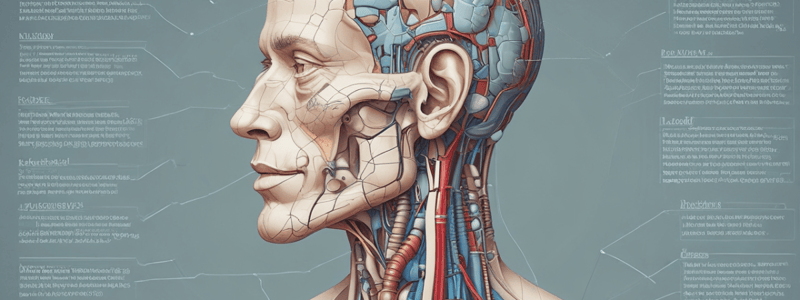Podcast
Questions and Answers
What does the suffix '-itis' typically indicate in a medical term?
What does the suffix '-itis' typically indicate in a medical term?
- inflammation or infection (correct)
- a surgical procedure
- a congenital condition
- a tumor or swelling
What is the root word 'cardi-' related to in a medical term?
What is the root word 'cardi-' related to in a medical term?
- the brain
- the heart (correct)
- the lungs
- the liver
What is the prefix 'endo-' related to in a medical term?
What is the prefix 'endo-' related to in a medical term?
- outside or external
- above or superior
- inside or internal (correct)
- below or inferior
What is the abbreviation 'MD' typically used to represent?
What is the abbreviation 'MD' typically used to represent?
What is the term for the study of the structure and function of the body?
What is the term for the study of the structure and function of the body?
Quale est le significato del prefixo 'hemi-' in un contesto de terminologia medical?
Quale est le significato del prefixo 'hemi-' in un contesto de terminologia medical?
Quale est le significato del suffisso '-pnea' in un contesto de terminologia medical?
Quale est le significato del suffisso '-pnea' in un contesto de terminologia medical?
Quale specialitate medical se foca in le tractamento de maladias del systema nervose central?
Quale specialitate medical se foca in le tractamento de maladias del systema nervose central?
Quale abbreviation medical est utilisate per representar 'doctors de medicina'?
Quale abbreviation medical est utilisate per representar 'doctors de medicina'?
Quale parte del corpore es describe per le termino 'cranio'?
Quale parte del corpore es describe per le termino 'cranio'?
Qual es le function de un prefixo in un termino medical?
Qual es le function de un prefixo in un termino medical?
Quale specialitate medical se foca in le tractamento de maladias del systema circulatori?
Quale specialitate medical se foca in le tractamento de maladias del systema circulatori?
Quale es le significato del suffisso '-algia' in un contesto de terminologia medical?
Quale es le significato del suffisso '-algia' in un contesto de terminologia medical?
Qual es le function del radice 'neur-' in un termino medical?
Qual es le function del radice 'neur-' in un termino medical?
Quale es le abbreviation medical pro 'medical doctor'?
Quale es le abbreviation medical pro 'medical doctor'?
Quale radice medical es relate al corde?
Quale radice medical es relate al corde?
Quale specialitate medical se foca in le tractamento de maladias del systema digestive?
Quale specialitate medical se foca in le tractamento de maladias del systema digestive?
Quale abbreviation medical es utilisate per representar 'doctors de medicina interna'?
Quale abbreviation medical es utilisate per representar 'doctors de medicina interna'?
Quale prefixo medical indica 'around' o 'circa'?
Quale prefixo medical indica 'around' o 'circa'?
Quale radice medical es relate al nervos?
Quale radice medical es relate al nervos?
What is the primary function of a prefix in a medical term?
What is the primary function of a prefix in a medical term?
What is the term for the study of the structure, function, and diseases of the skin?
What is the term for the study of the structure, function, and diseases of the skin?
What is the meaning of the root word 'osteo-' in a medical term?
What is the meaning of the root word 'osteo-' in a medical term?
What is the abbreviation 'ICU' typically used to represent?
What is the abbreviation 'ICU' typically used to represent?
What is the term for the study of the structure, function, and diseases of the kidneys?
What is the term for the study of the structure, function, and diseases of the kidneys?
Flashcards are hidden until you start studying
Study Notes
Medical Terminology Basics
- Medical root words: words that form the core of medical terms, carrying the primary meaning
- Medical root words: often derived from Greek or Latin words, used to build medical terminology
Suffixes in Medical Terminology
- Suffixes: word endings that modify the meaning of a medical term
- Examples of suffixes: -algia (pain), -itis (inflammation), -oma (tumor)
- Suffixes: often indicate a condition, procedure, or body part
Prefixes in Medical Terminology
- Prefixes: word beginnings that modify the meaning of a medical term
- Examples of prefixes: anti- (against), hypo- (under), meta- (beyond)
- Prefixes: often indicate a direction, location, or extent
Medical Abbreviations
- Medical abbreviations: shortened forms of medical terms
- Examples of medical abbreviations: Dr. (Doctor), Rx (prescription), BP (blood pressure)
- Medical abbreviations: used to simplify documentation and communication
Communication in Medical Terminology
- Effective communication: crucial in medical professionals' communication
- Medical terms: used to convey specific information, facilitate understanding
- Medical terminology: enables accurate and precise communication among healthcare professionals
Medical Specialties
- Medical specialties: areas of medical practice focused on specific aspects of health
- Examples of medical specialties: cardiology (heart), neurology (brain and nervous system), oncology (cancer)
Anatomical Terminology
- Anatomical terminology: used to describe body parts and functions
- Examples of anatomical terms: anterior (front), posterior (back), distal (farthest from the body)
- Anatomical terminology: essential for accurate descriptions and diagnoses
Medical Terminology Basics
- Medical root words: words that form the core of medical terms, carrying the primary meaning
- Medical root words: often derived from Greek or Latin words, used to build medical terminology
Suffixes in Medical Terminology
- Suffixes: word endings that modify the meaning of a medical term
- Examples of suffixes: -algia (pain), -itis (inflammation), -oma (tumor)
- Suffixes: often indicate a condition, procedure, or body part
Prefixes in Medical Terminology
- Prefixes: word beginnings that modify the meaning of a medical term
- Examples of prefixes: anti- (against), hypo- (under), meta- (beyond)
- Prefixes: often indicate a direction, location, or extent
Medical Abbreviations
- Medical abbreviations: shortened forms of medical terms
- Examples of medical abbreviations: Dr. (Doctor), Rx (prescription), BP (blood pressure)
- Medical abbreviations: used to simplify documentation and communication
Communication in Medical Terminology
- Effective communication: crucial in medical professionals' communication
- Medical terms: used to convey specific information, facilitate understanding
- Medical terminology: enables accurate and precise communication among healthcare professionals
Medical Specialties
- Medical specialties: areas of medical practice focused on specific aspects of health
- Examples of medical specialties: cardiology (heart), neurology (brain and nervous system), oncology (cancer)
Anatomical Terminology
- Anatomical terminology: used to describe body parts and functions
- Examples of anatomical terms: anterior (front), posterior (back), distal (farthest from the body)
- Anatomical terminology: essential for accurate descriptions and diagnoses
Medical Terminology Basics
- Medical root words: words that form the core of medical terms, carrying the primary meaning
- Medical root words: often derived from Greek or Latin words, used to build medical terminology
Suffixes in Medical Terminology
- Suffixes: word endings that modify the meaning of a medical term
- Examples of suffixes: -algia (pain), -itis (inflammation), -oma (tumor)
- Suffixes: often indicate a condition, procedure, or body part
Prefixes in Medical Terminology
- Prefixes: word beginnings that modify the meaning of a medical term
- Examples of prefixes: anti- (against), hypo- (under), meta- (beyond)
- Prefixes: often indicate a direction, location, or extent
Medical Abbreviations
- Medical abbreviations: shortened forms of medical terms
- Examples of medical abbreviations: Dr. (Doctor), Rx (prescription), BP (blood pressure)
- Medical abbreviations: used to simplify documentation and communication
Communication in Medical Terminology
- Effective communication: crucial in medical professionals' communication
- Medical terms: used to convey specific information, facilitate understanding
- Medical terminology: enables accurate and precise communication among healthcare professionals
Medical Specialties
- Medical specialties: areas of medical practice focused on specific aspects of health
- Examples of medical specialties: cardiology (heart), neurology (brain and nervous system), oncology (cancer)
Anatomical Terminology
- Anatomical terminology: used to describe body parts and functions
- Examples of anatomical terms: anterior (front), posterior (back), distal (farthest from the body)
- Anatomical terminology: essential for accurate descriptions and diagnoses
Medical Terminology Basics
- Medical root words: words that form the core of medical terms, carrying the primary meaning
- Medical root words: often derived from Greek or Latin words, used to build medical terminology
Suffixes in Medical Terminology
- Suffixes: word endings that modify the meaning of a medical term
- Examples of suffixes: -algia (pain), -itis (inflammation), -oma (tumor)
- Suffixes: often indicate a condition, procedure, or body part
Prefixes in Medical Terminology
- Prefixes: word beginnings that modify the meaning of a medical term
- Examples of prefixes: anti- (against), hypo- (under), meta- (beyond)
- Prefixes: often indicate a direction, location, or extent
Medical Abbreviations
- Medical abbreviations: shortened forms of medical terms
- Examples of medical abbreviations: Dr. (Doctor), Rx (prescription), BP (blood pressure)
- Medical abbreviations: used to simplify documentation and communication
Communication in Medical Terminology
- Effective communication: crucial in medical professionals' communication
- Medical terms: used to convey specific information, facilitate understanding
- Medical terminology: enables accurate and precise communication among healthcare professionals
Medical Specialties
- Medical specialties: areas of medical practice focused on specific aspects of health
- Examples of medical specialties: cardiology (heart), neurology (brain and nervous system), oncology (cancer)
Anatomical Terminology
- Anatomical terminology: used to describe body parts and functions
- Examples of anatomical terms: anterior (front), posterior (back), distal (farthest from the body)
- Anatomical terminology: essential for accurate descriptions and diagnoses
Medical Terminology Basics
- Medical root words: words that form the core of medical terms, carrying the primary meaning
- Medical root words: often derived from Greek or Latin words, used to build medical terminology
Suffixes in Medical Terminology
- Suffixes: word endings that modify the meaning of a medical term
- Examples of suffixes: -algia (pain), -itis (inflammation), -oma (tumor)
- Suffixes: often indicate a condition, procedure, or body part
Prefixes in Medical Terminology
- Prefixes: word beginnings that modify the meaning of a medical term
- Examples of prefixes: anti- (against), hypo- (under), meta- (beyond)
- Prefixes: often indicate a direction, location, or extent
Medical Abbreviations
- Medical abbreviations: shortened forms of medical terms
- Examples of medical abbreviations: Dr. (Doctor), Rx (prescription), BP (blood pressure)
- Medical abbreviations: used to simplify documentation and communication
Communication in Medical Terminology
- Effective communication: crucial in medical professionals' communication
- Medical terms: used to convey specific information, facilitate understanding
- Medical terminology: enables accurate and precise communication among healthcare professionals
Medical Specialties
- Medical specialties: areas of medical practice focused on specific aspects of health
- Examples of medical specialties: cardiology (heart), neurology (brain and nervous system), oncology (cancer)
Anatomical Terminology
- Anatomical terminology: used to describe body parts and functions
- Examples of anatomical terms: anterior (front), posterior (back), distal (farthest from the body)
- Anatomical terminology: essential for accurate descriptions and diagnoses
Studying That Suits You
Use AI to generate personalized quizzes and flashcards to suit your learning preferences.




